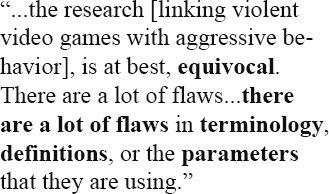(Editor’s Note: The following interview was recorded this past September, exclusively for BOOM Salad.)
BOOM: Greetings Dr. Ceranoglu and thank you for your willingness to share your thoughts with our readers.
Dr. Ceranoglu: You are welcome.
BOOM: If I may, what is it that interests you about the subject of so-called, “violent-video games” and their effect on behavior?
Dr. Ceranoglu: The reason that [the subject] has been interesting to me is that in all of this conversation about video games, I think we are missing the big picture, because the conversation has been high-jacked or dominated, with concerns about the violence, and the link between the video games and violence. But the research on that is, at best, equivocal. There are a lot of flaws, that you have already mentioned [on BOOM Salad] so I am not going to go into that in detail, but there are a lot of flaws in terminology, definitions, or the parameters that they are using.

In all this, we are missing a bigger picture. There are some non-controversial effects of video games and media in children’s lives. When it comes to sleep, when it comes to attention, when it comes to academic performance, and other experiences in the child’s life, which is being displaced by time spent on video games. That’s what we’re missing, we have missed out on that conversation because our attention is [predominantly] on violence.
The studies that I look at are interesting to me because they tell about the relationship between the video game and video game play and [their effect on] attention or cognitive functions of a child, and these studies are done, usually, by neuroscientists.
BOOM: Over the last three months, BOOM Salad has interviewed several leading scientists that have conducted research, specific to video games that have violent depictions. In one such interview, a noted proponent, and one of the pioneers of the anti-violent video game argument, stated that, “there is no [clinical] definition for a violent video game.” By saying that it would seem that he has compromised his own research, or at least undermined the claim that his findings demonstrate a link between aggressiveness and the playing of, “violent-video games,” since, according to him, there is no such thing. How do you respond to that?
 Dr. Ceranoglu: The problem is that [the definitions being used by these studies are] not coherent. They are fuzzy at best. Not only are the definitions incoherent, but they are not uniform. What they are measuring is not necessarily descriptive of the problem at hand, or violence or aggression. [For instance], one of the tests they use for cognitive precursor is they have people play a violent-video game, and then they have them do a fill-in-the-blank test. First of all, a person is not a machine. How that person reacts to something on that one occasion, does not necessarily carry over if the circumstances were completely different. I see kids play Call of Duty, and [other] violent games, and they make jokes and laugh about it (see Video below). But, when they see the real thing in the emergency room, they are scared to death, just like you or I would be. They react just like everyone else. People are not machines.
Dr. Ceranoglu: The problem is that [the definitions being used by these studies are] not coherent. They are fuzzy at best. Not only are the definitions incoherent, but they are not uniform. What they are measuring is not necessarily descriptive of the problem at hand, or violence or aggression. [For instance], one of the tests they use for cognitive precursor is they have people play a violent-video game, and then they have them do a fill-in-the-blank test. First of all, a person is not a machine. How that person reacts to something on that one occasion, does not necessarily carry over if the circumstances were completely different. I see kids play Call of Duty, and [other] violent games, and they make jokes and laugh about it (see Video below). But, when they see the real thing in the emergency room, they are scared to death, just like you or I would be. They react just like everyone else. People are not machines.

BOOM: So then Doctor, what should we be looking at?
Dr. Ceranoglu: First off, should we really look at if video games cause violence or not? Is that what we should be looking at in expense of other priorities? Is that where we should be spending our research dollars? What about poverty? Or, the socio-economic climate that’s going on? Where parents are being pushed out of homes, chasing two or three jobs, because they can’t make ends meet. [Life] is much more than the video game. Shouldn’t we start with that [as our guide]?
Once we have all the questions answered and problems solved, maybe then we can start looking at the effect of video games. In that situation we should start with comparative studies that gather data to a minute detail of what kids are doing at home, with friends, outside, their athletic involvement, their academic involvement, their family structure, family approaches, and video game habits, and what is their aggression or violence or delinquency in later years.
